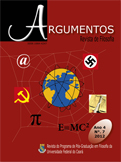On Williamson's theory of non-analysis of knowledge
Keywords:
Análise. Conhecimento. Justificação. Crença. Verdade.Abstract
Há uma intuição perene em teoria do conhecimento segundo a qual o conhecimento é analisável. Grosso modo, supõe-se que o conceito conhecimento pode ser elucidado graças a conceitos mais primitivos e mais claros do que o próprio conceito de conhecimento. Esta perspectiva foi recentemente desafiada de forma severa por Timothy Williamson, o qual argumenta que não é possível encontrar-se uma análise conceptual verdadeira do conhecimento e que o próprio conceito de conhecimento é primitivo. Neste ensaio inspeccionamos essa teoria e algumas réplicas, concluindo que os argumentos de Williamson contra o projecto de análise do conhecimento somente colhem à luz de uma interpretação usual mas quanto a nós demasiado rígida do significado de ‘análise’. No final do ensaio submetemos uma interpretação alternativa de ‘análise’ que deixa em aberto a possibilidade de elucidar-se o conceito de conhecimento por essa via. O nosso derradeiro objectivo é mostrar as vantagens teóricas resultantes dessa possibilidade.
Downloads
Published
Issue
Section
License
Argumentos magazine is licensed under an International Creative Commons Attribution License.
The Magazine uses CC BY inclusion
1) The authors retain the copyright granted to the magazine or the right to initial publication, with the work regularly licensed under the Creative Commons Attribution, which allows the sharing of the work with acknowledgment of authorship and initial publication in this magazine.
2) The authors are authorized to contract additional applicable contracts, for non-exclusive distribution of the version of the work published in this journal (for example, publication in the institutional repository or as a chapter of the book), recognition of authorship and initial publication in this journal.
3) Authors are authorized and encourage to publish and distribute their work online (for example, in institutional repositories or on their personal pages) at any time before or during the editorial process, as they can generate productive changes, as well as increase the impact and reference of published work.




.jpg)










._._3.png)
1.jpg)
._._._.png)
